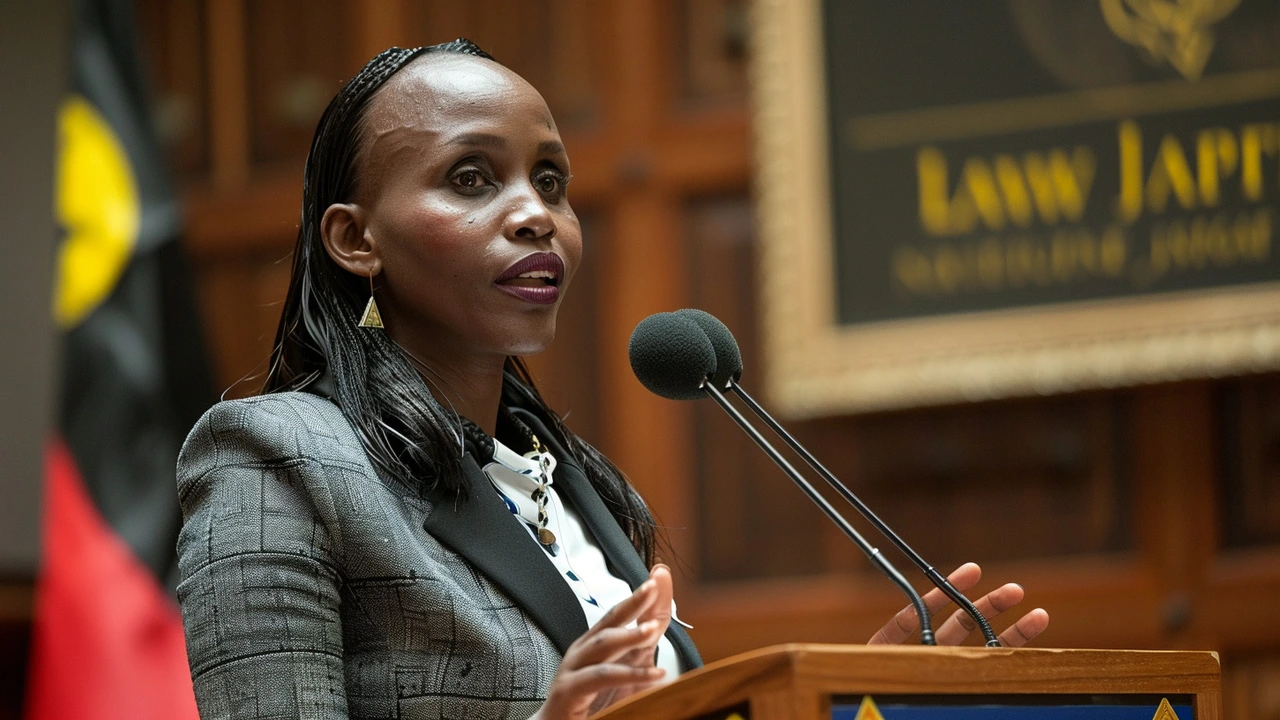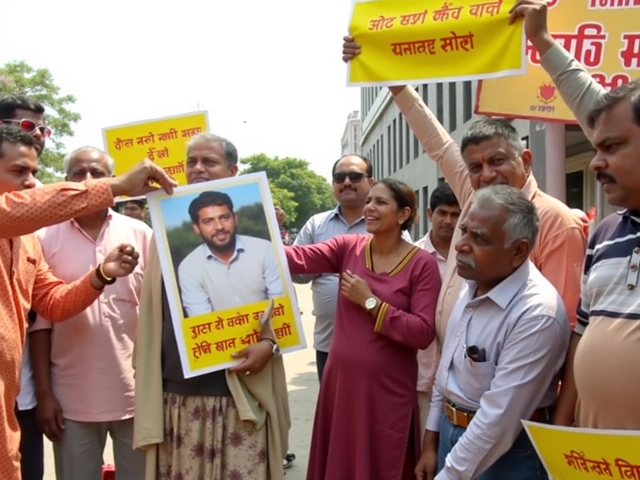Introduction
The decision by the Law Society of Kenya (LSK) to move to court to halt the deployment of Kenya Defence Forces (KDF) within the country has stirred significant debate. This legal battle follows a motion approved by Parliament and gazetted by Defense Cabinet Secretary Aden Duale, authorizing the KDF deployment. The intended purpose of this action is to restore order after recent protests against the Finance Bill turned violent. However, the LSK contends that the KDF is not the appropriate entity for such a task. This article delves into the details of the LSK's arguments, the government's justification, and the potential implications of this deployment.
Background of the Protests
Tuesday's anti-Finance Bill protests in Kenya escalated rapidly, resulting in significant unrest. Thousands of citizens took to the streets to voice their grievances against the proposed financial legislation, which many believe will exacerbate economic hardships. The situation deteriorated as the demonstrations turned violent, prompting the government to consider drastic measures to restore peace and order.
The National Assembly, led by Majority Leader Kimani Ichung'wah, swiftly moved to approve the deployment of the KDF to assist the police in managing the situation. This decision was formalized through a gazette notice issued by Defense Cabinet Secretary Aden Duale. The justification for this move, according to government officials, is to bolster the capabilities of the police force in controlling the escalating violence and ensuring the safety of citizens and property.

The LSK's Arguments Against KDF Deployment
The Law Society of Kenya has presented a robust case against the deployment of the KDF for internal security purposes. One of their primary arguments is the absence of an official declaration of emergency or unrest significant enough to warrant military intervention. According to the LSK, the Kenyan constitution and legal framework only allow for such measures under exceptional circumstances, which they argue are not present in this situation. They stress that the KDF is not specifically trained for handling domestic peacekeeping or civil disturbances, skills that are distinct from military combat operations.
Furthermore, the LSK criticizes the state's failure to demonstrate that the national police force is overwhelmed or incapable of managing the protests. The society argues that deploying the military without clear evidence of the police force's inadequacy undermines the professionalism and capacity of the national police. They also raise concerns about potential human rights violations, considering the military's different rules of engagement compared to civilian law enforcement agencies.
Legal Proceedings and Immediate Actions
In response to the LSK's petition, Justice Lawrence Mugambi has taken swift action by directing that the respondents be served with the petition. A hearing is scheduled for Thursday, where the court will deliberate on the merits of the case. This timely intervention is crucial, as it ensures that the issues raised by the LSK are addressed promptly, potentially preventing what they see as an unnecessary and possibly hazardous deployment of military forces within the country.
The court's decision will hinge on several key factors, including the interpretation of constitutional provisions regarding the deployment of the military for internal security and the adequacy of the police response to the protests. The outcome could set a significant legal precedent for future cases involving the application of military force in civilian contexts.

Government's Stance and Justification
The government, on the other hand, maintains that the deployment of the KDF is a necessary and lawful measure to restore order amidst rising violence. Officials argue that the unprecedented scale of the protests and the resultant chaos required an immediate and decisive response. The backing of Parliament lends legal and political legitimacy to this decision, with proponents asserting that the military's involvement will provide the necessary support to the police force in restoring normalcy.
Defense Cabinet Secretary Aden Duale, who gazetted the deployment, has emphasized the temporary nature of the measure, underscoring that the KDF will operate in a support role to the police. This, they argue, ensures that the primary responsibility for maintaining law and order remains with civilian law enforcement agencies. The government further argues that the fast-paced evolution of the protests into violent confrontations necessitated rapid action to prevent further escalation and potential harm to the public and property.
Broader Implications and Expert Opinions
The controversy surrounding the deployment has sparked a broader conversation about the role of the military in domestic matters. Experts and analysts have weighed in on both sides of the debate. Proponents of the deployment argue that the extraordinary circumstances justify exceptional measures. They cite historical instances where military intervention has been deemed necessary to stabilize volatile situations, often with successful outcomes.
Critics, however, warn of the dangers associated with blurring the lines between military and civilian roles. They highlight potential risks, including human rights abuses, erosion of public trust in law enforcement, and the precedent it sets for future deployments. Human rights organizations and civil society groups have echoed the LSK's concerns, calling for the government to explore alternative measures that do not involve the military, such as reinforcing police capabilities and engaging in meaningful dialogue with protestors.

Conclusion
The court's upcoming decision on the LSK's petition will be a pivotal moment for Kenya. Beyond addressing the immediate issue of KDF deployment, it will reflect the delicate balance between security and civil liberties. This case will likely resonate beyond Kenyan borders, offering lessons and cautionary tales for countries facing similar challenges. As the nation waits for the court's ruling, the discourse it has sparked underscores the importance of constitutional adherence and the need for carefully considered responses in times of crisis.






Henry Cohen
June 26, 2024 AT 22:39yeah sure the KDF will magically solve every protest problem, no need for police training at all.
Mark Langdon
June 28, 2024 AT 16:19Look, I get the frustration, but tossing the military into a civilian dispute rarely ends well for the people on the ground.
Ciara Russell-Baker
June 30, 2024 AT 09:59Honestly, sending soldiers to handle a street protest is just plain dumb and shows a lack of real leadership.
Aaron Samarita
July 2, 2024 AT 03:39The Kenyan constitution explicitly reserves the use of the armed forces for external defence and clear emergencies. Deploying the KDF without a declared state of emergency sets a dangerous precedent that could be weaponised by future governments. History is littered with examples where militarised crowd control escalated violence rather than quelled it. In the 1970s, a comparable move in a neighbouring country resulted in civilian casualties that still haunt the region. Moreover, the police force, while admittedly strained, possesses the legal mandate and training for crowd management. The legal framework requires a proportional response, and the military’s rules of engagement are not calibrated for civilian protests. Human rights organisations have repeatedly warned that soldiers on the streets increase the risk of arbitrary arrests. The LSK’s petition highlights that no independent assessment has proven the police incapable of handling the unrest. If the courts allow this deployment, it could erode public trust in both the police and the judiciary. The deployment could also embolden political actors to bypass civil institutions when faced with dissent. Constitutional scholars argue that the separation of powers implies a check on executive overreach in security matters. The temporary nature asserted by officials does not mitigate the long‑term implications for civil‑military relations. Journalists on the ground have already reported intimidation of media crews following the announcement. The broader African community is watching, and Kenya’s handling of this could influence regional norms. Ultimately, a balanced approach that strengthens police capacity and opens dialogue respects both security and liberty.
Daisy Pimentel
July 3, 2024 AT 21:19That was a solid rundown, but let’s not forget that even the best‑trained police can be overwhelmed, and moral responsibility sometimes demands extraordinary measures.
Ellen Ross
July 5, 2024 AT 14:59From an elitist perspective, the state’s reliance on brute force reveals a profound failure of intellectual governance; culture‑savvy solutions are conspicuously absent.
Fabian Rademacher
July 7, 2024 AT 08:39What they don’t tell you is that the same elites who push the deployment also hide their own connections to the defense contractors profiting from every troop movement.
Terrell Mack
July 9, 2024 AT 02:19Just watching the news, I’m thinking maybe the government could've tried more community mediators before calling in the army.
Ashlynn Barbery
July 10, 2024 AT 19:59While community mediation is a valuable tool, the immediate threat of property damage and loss of life may necessitate a rapid, coordinated response that civilian agencies alone might not provide.
Sarah Graham
July 12, 2024 AT 13:39I feel the conversation is getting too heated; let’s keep in mind that both sides want a peaceful Kenya.
Jauregui Genoveva
July 14, 2024 AT 07:19Peaceful Kenya? 🙄 Sure, if you ignore the fact that politics keeps spilling over into the streets.
naman sharma
July 16, 2024 AT 00:59It is evident that the deployment is part of a larger scheme to consolidate power under the guise of national security, orchestrated by unseen interests.
Quinten Squires
July 17, 2024 AT 18:39Look the law says one thing but the real game is about who controls the narrative and the troops are just pawns in that game
Tyler Manning
July 19, 2024 AT 12:19Patriots understand that a strong military presence can deter chaos and preserve the sovereignty that our ancestors fought for.
james patel
July 21, 2024 AT 05:59From a policy implementation standpoint, the interagency coordination matrix must account for command‑and‑control protocols to mitigate jurisdictional overlap.
Scarlett Mirage
July 22, 2024 AT 23:39Indeed, the constitutional provisions-if interpreted correctly-should preclude any military involvement in civil matters!!!
Ian Sepp
July 24, 2024 AT 17:19While your enthusiasm is noted, a more measured analysis of the legal texts is advisable before drawing such definitive conclusions.
Sweta Agarwal
July 26, 2024 AT 10:59Oh great, because the best way to calm protesters is to give them a marching band of tanks, right?
Grace Melville
July 28, 2024 AT 04:39Peaceful solutions are always better 😇
Dawn Waller
July 29, 2024 AT 22:19i cant blelieve they r doing this lol!!!